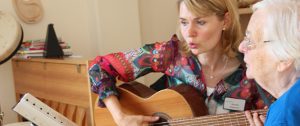24-03-2023. Ideopathic Parkinson's Syndrome (iPS), too Parkinson's disease called, is the second most common neurodegenerative disease. In addition to the motor symptoms, the speech disorder (dysarthria) is a widespread symptom. The voice becomes hoarse, quieter and loses expression and speech melody. This is associated with limitations in communication skills and quality of life.

Music has a direct effect on the motor function disturbed by the iPS and generally plays a major role in the activating therapy of this disease. Singing has long been known as a therapeutic measure for dysarthria. The rhythm and the beat ensure better vocalization and clearer articulation. In addition, the structure with melody and harmonic accompaniment helps to deepen breathing and translate it into voice in a more coordinated way. Therefore, singing for therapeutic purposes is not about beautiful tones or clean intonation. Singing is therapeutic in and of itself.
In a review article, all previously conducted therapy studies on singing in Parkinson's have now been systematically evaluated. 12 clinical follow-up studies were found and compared with regard to the therapy effects. There were indications of possible positive effects on respiratory and voice function. Finally, the authors have put together practical tips for singing with those affected by iPS. The first author, Stefan Mainka, is an experienced music therapist who has been working with these patients at the Beelitz-Heilstätten Parkinson's Clinic in Brandenburg for over 20 years. Yoon Irons, also a music therapist, is a PhD in therapeutic singing and teaches and researches at the University of Derby in England.
A key to singing as therapy is pitch, because people with Parkinson's tend to have a reduced range. There is now even a plugin for the browser for this purpose. With this tool, every online music stream can be changed not only in its tempo, but also in its pitch and thus adapted to individual needs. The plugin is called Transpose and was developed by Google for the Chrome browser. With its help, the computer becomes a karaoke machine via YouTube. There are also various apps for karaoke (e.g. SMULE) that can support singing.
.
Mainka, S, Irons JY (2022). Singing as a therapeutic intervention in people with Parkinson's disease. A systematic review. Musiktherapeutic Umschau 43;3: 210-223. http://dx.doi.org/10.13109/muum.2022.43.3.210